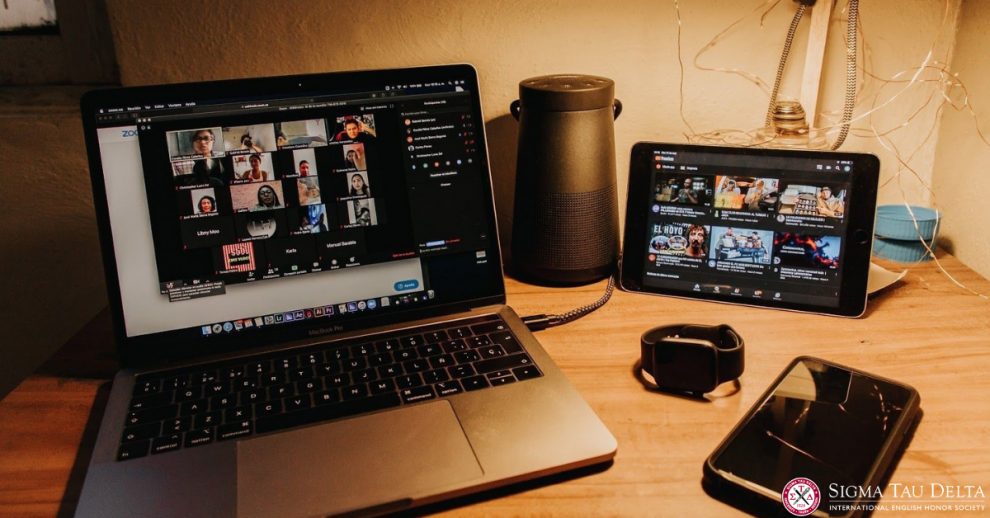Perhaps one of the most unfortunate derelictions of the COVID-19 pandemic is the effective standstill it has wrought on the planet’s major events. As the cancellation of sporting seasons, music festivals, and academic conferences (including our own Sigma Tau Delta 2020 International Convention in Las Vegas last year) first consumed the news cycle in avalanche-like proportions, I am reminded of one of my last in-person interactions with a professor on my college’s campus. “What time to be alive,” she lamented, in utter disbelief, “to witness plague forcing the closure of the playhouses once again.
Of course, in such bewildering times as these, it is just as important to celebrate our tenacity and flexibility when it comes to the festivities and conventions that have traditionally brought us together. Both in the headlines I read on my phone and the emails I receive from my college’s campus life offices, I am inspired by our proclivity to utilize technology to modify beloved hallmarks of culture and revelry. And while many of us might be ready to roll our eyes the next time we see or hear the word “virtual” inserted into concerts and performances, I hope this article might remind you of the growing prevalence of virtual events and programming in our daily lives, especially in the world of higher education.
Colleges across the country are currently navigating the placement of higher education in a COVID-ridden world, with hundreds of models falling somewhere between the spectrum of safe reopening and sharp reimagining. While much of the conversation revolves around the fate of the classroom, you can ask any college student, current or former, about their fondest memories of being a student, and many of those anecdotes often come from the community that exists beyond the desks and the whiteboards. It should come as no surprise, then, that the task of digitizing robust campus communities is sometimes spearheaded by passionate student leaders and organizers.
Take, for example, Newman University undergrad and Student Representative Machen Olson’s recent orchestration of an open mic night over Zoom, hosted by her school’s Sigma Tau Delta chapter. Machen saw this as an opportunity to not only provide a creative space for voices on her own campus, but broadened the invitation to any and all interested students by networking with her fellow Student Representatives. Inviting readers from all over the country is only made possible by the digitization of campus events—a rare advantage brought in by the pandemic’s imposition—and although a standard academic year would’ve convened Newman’s campus last fall, a virtual open-mic allowed Machen to get her start with chapter activities as early as midsummer.
With thousands of campuses and hundreds of thousands of students sharing these common goals of community endurance and interconnectivity, Machen’s success story barely scratches the surface of the many conversations orbiting virtual event programming. With her success in mind, ask yourself what you can do to join the ranks of passionate student voices leading the charge against isolation during the academic year; what events would lend themselves well to the virtual format? What would motivate you to open up the laptop, grab a pair of headphones, and click the Zoom link for an evening of digital indulgence? As a student grappling with these questions myself, I leave you with these few principles that have guided my pursuit of virtual programming:
- As much as it has dominated our contingency culture, Zoom is not the only answer to virtual connection; Google Hangouts, Microsoft Teams, and other video web chat platforms are not only viable alternatives, but might be more user-friendly for your intended participants.
- Virtual events never have to remain confined to the dull grid of a conference call. There are plenty of free web-based applications that can be used to innovate the evening’s activities, including user-friendly trivia services offered by Kahoot, the chaos of a Jackbox party, or Netflix’s newly-debuted Watch Party browser plug-in.
- Sometimes, there’s no shame in riding the coattails of another person’s virtual legwork. There are plenty of free or low-cost virtual events being organized by organizations in your school’s area. Or, check out nationwide resources like the National Theatre for monthly streamings of live performances.
- Embrace the unpredictability of it all! An online event is inevitably susceptible to the minor pitfalls of sound glitches, unstable Internet connections, and your loudest roommate forgetting you were running an evening game of virtual bingo. All of these spontaneous hiccups are what makes virtual event programming high-risk, high-reward.
And, of course, make sure to join us at the Sigma Tau Delta 2021 Virtual Convention on March 25-27. Check out the Schedule Preview to learn more. A full session schedule will be available for all registrants after March 8. Register to attend by March 22.
 Brett Iarrobino
Brett Iarrobino
Student Representative, Eastern Region, 2020-2021
Alpha Chi Xi Chapter
Clark University, Worcester, MA
More from Footnotes: March 2, 2021
Why You Should Attend Convention
Student Leadership Opportunities
Apply for Spring Scholarships
Sigma Tau Delta Journal Internship






Add Comment